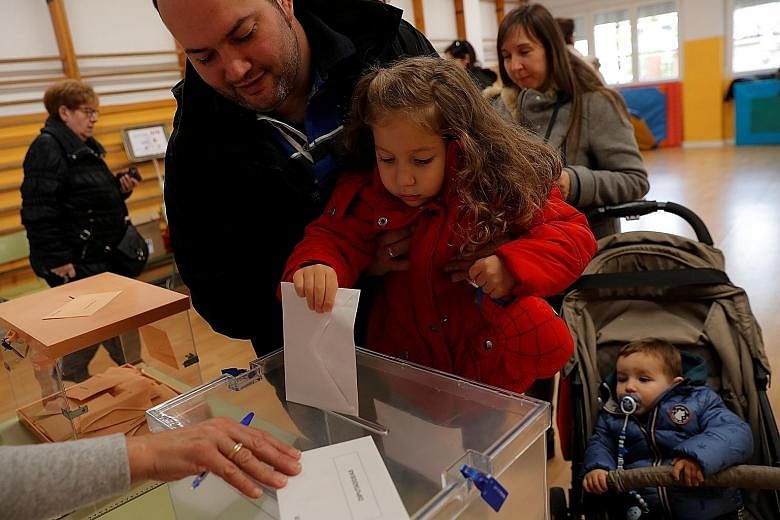MADRID • Spain voted yesterday in its fourth general election in as many years amid heightened tensions over Catalonia's separatist push, an issue that has fuelled a surge in support for the upstart far-right party Vox.
The repeat polls were called after Prime Minister Pedro Sanchez failed to secure support from other parties following an inconclusive election in April which saw his Socialist party win the most votes, but no working majority in Parliament.
Mr Sanchez avoided questions yesterday about a likely political stalemate.
Voting in mainland Spain was to end at 8pm local time, with results to begin emerging in the early evening, and almost all votes counted by midnight.
Opinion polls have suggested that this new election would fail to break the deadlock. Neither the left nor the right looked likely to win a ruling majority in Spain's 350-seat Parliament.
The Socialists looked set to finish top again, but with slightly fewer seats than they picked up in April. The main opposition conservative Popular Party (PP) may also strengthen its parliamentary presence.
But the most striking development could be the rise of the far-right Vox party, which might even jump to third-largest in Parliament, according to recent polling.
Spain has been struggling to put stable governments together since 2015, when new parties emerged from the financial crisis following decades during which power oscillated between the Socialists and the PP.
The election also comes as Spain finds itself increasingly polarised by the Catalan crisis, which has deepened in recent weeks.
Less than a month ago, Spain's Supreme Court sentenced nine Catalan separatist leaders to lengthy jail terms over their role in a failed 2017 independence bid, sparking days of angry street protests in Barcelona and other Catalan cities that sometimes turned violent.
During a recent TV election debate, PP leader Pablo Casado called for a "real government that will put order in Catalonia".
But the toughest line against the Catalan separatists has come from Vox leader Santiago Abascal. "Drastic solutions are needed," he said during his final campaign rally last Friday night in Madrid.
He then repeated his pledge to end the Catalan crisis by suspending Catalonia's regional autonomy, banning separatist parties and arresting its regional president Quim Torra, who has vowed to continue the secession drive.
A minority government led by the Socialists appeared the most likely outcome, opinion polls showed, but an even bigger question is who the Socialists may ally with and how long any government can last with a very fragmented Parliament.
Older Spaniards still remember first-hand the dictatorship of Francisco Franco, who ruled from 1939 to 1975, and many voters were still undecided days before the vote, meaning other scenarios are also possible.
However, one thing was certain yesterday: Voters were tired of being called to the polls - there were also regional and European Union elections this year. That alone increased the chances that parties would make more of an effort this time to reach a deal over governing and shy away from yet another repeat ballot.
The overall result was likely to be very close, leaving the door open to several possible configurations.
The central government in Madrid, wary of a repeat of last month's riots, has sent 2,500 extra national police officers to reinforce Catalonia's regional police force.
In total, more than 92,000 police will be deployed across Spain to safeguard the vote.
AGENCE-FRANCE PRESSE, REUTERS

